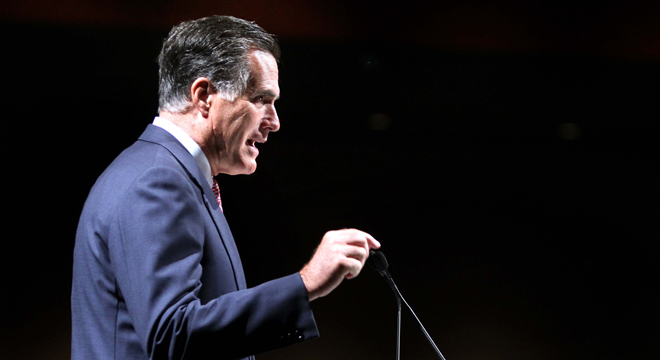Because he’s refused to release more than two years of tax returns, and has rooted his entire campaign in tax, spending, and economic growth plans that lack critical details and defy logical scrutiny, Mitt Romney’s critics, starting with senior Obama advisers, have assailed him as the least transparent candidate since Richard Nixon.
It’s a catchy attack — one that recalls not just Nixon’s candidacies, but his scandal-plagued presidency and ignominious resignation. Which is no doubt why “least transparent candidate since Nixon” has become one of Chicago’s favorite phrases.
But setting aside the Obama campaign’s partisan desire to make voters think of Watergate when they hear the name Mitt Romney, there’s something to the notion that Romney is unusually opaque compared to presidential candidates in the modern era, according to some presidential historians.
“I think the comparison to Nixon is not a very good one, because … Nixon may have been a shadier character in some respects — the Southern strategy, laundering campaign money — but he abided by the norms of the time in terms of disclosure,” said Norm Ornstein, a political scientist at the American Enterprise Institute.
Candidates in earlier decades inhabited different political cultures, faced different pressures and different media. In some ways, those differences have made it harder for Romney to get by on a purely superficial appeal to voters. But Ornstein said despite new challenges, Romney stands alone as the least-known quantity to be within grasping distance of the White House in the modern era.
“I think there’s nobody like Romney,” Ornstein. “Romney is like the Michael Phelps of presidential candidates. if you’re looking for gold medals in terms of audacious lying, and adamant refusal to turn over personal information, nobody comes close. I’m sure others would’ve liked to have done it, but the culture in the past was one where lying attracted some level of approbation and shame.”
To Bruce Buchanan, a presidential historian at the University of Texas at Austin, Romney’s drawn attention to himself in a unique way.
“Just the fact of avoiding specifics is not all that unusual,” he said. “The fact of doing it in the context of claims that other analysts conclude don’t add up and not being willing to address those concerns, is a little less common in my memory at least.”
Romney’s fiscal policies remind Buchanan of Nixon’s 1968 campaign, in which he pledged to end the war in Vietnam without providing details — what came to be known as his “secret plan.” Likewise, after winning his first election in 1980 on fairly specific pledges to reduce deficits, cut social programs, and increase defense spending, Ronald Reagan glided to re-election in 1984 largely on the winds of an improving economy.
“In the second campaign it was all gauzy,” Buchanan said.
But that was after Reagan, like Obama, had amassed a four-year record.
“Not many have been as under as much scrutiny as Romney because he’s saying he can do things that on the face of it seem illogical and un-doable, and that creates more pressure on him to provide specifics,” Buchanan said. “That’s what’s different about Romney.”
Of course, the history of presidential politics is littered with candidates who understood the perils of getting too specific.
Not all historians place Romney in historically uncharted territory.
“I feel that Romney has disclosed a bit less than usual, but again, I’m not sure we are in unprecedented territory,” says Edward Widmer, a historian and one time speechwriter for Bill Clinton. “You mention Nixon’s secret plan for Vietnam was an interesting example of a vague promise that sounded good, without many details offered. Eisenhower also hit a good way of talking about the Korean War in 1952 when he simply said, ‘I will go to Korea,’ though no one knew exactly what that meant.”
To Widmer’s point, Romney is by no means the first to run on unrealistic fiscal plans.
“You could go back to a bunch of candidates talking about tax cuts bringing in more revenue,” Ornstein said. “I think George W. Bush is pretty close to the top of that list. I suppose you can talk about Lyndon Johnson campaigning on ‘guns and butter'” — the idea that Vietnam War costs didn’t have to be offset with higher taxes or cuts to domestic spending.
“But they don’t come close to Romney,” Ornstein added.
Romney’s been pretty candid — to friendly sources — about why he’s been so platitudinous.
“One of the things I found in a short campaign against Ted Kennedy was that when I said, for instance, that I wanted to eliminate the Department of Education, that was used to suggest I don’t care about education,” Romney told the conservative Weekly Standard in April. “So I think it’s important for me to point out that I anticipate that there will be departments and agencies that will either be eliminated or combined with other agencies….but I’m not going to give you a list right now.”
“I can’t remember anyone being that bald faced on it off the top of my head,” Buchanan told me. “I suspect it was like that 47 percent comment — it wasn’t intended for a wide audience. It just got picked up and reported.”
The other side of the coin is that Romney’s life story — his youth, his early career, his governorship, if not his finances — are plain to everybody in a way that wasn’t possible half a century ago.
“I will say that from a historical perspective, Romney is an open book,” says H.W. Brands, also a presidential historian at UT Austin. “All candidates these days are. Not as open, perhaps, as the media would wish. They, for understandable reasons, want everything. But we know a whole lot more about Romney than about, say, John Kennedy.”










